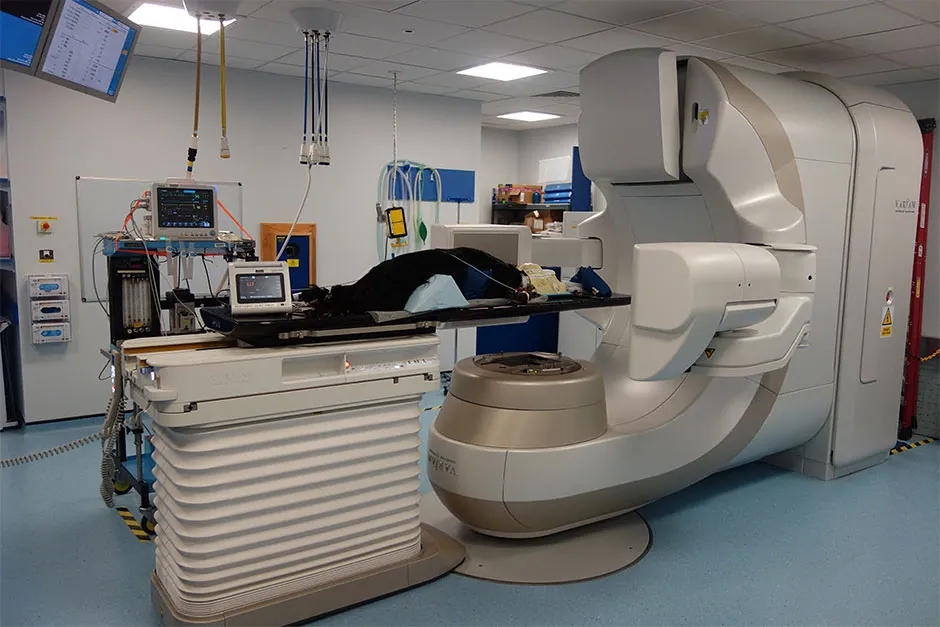A dog has been successfully treated with a high-tech human cancer therapy in what is being claimed as a UK first.
Ralph, a five-year-old Gordon Setter, was treated with a specialised radiation beam, sculpted to the exact shape of his tumour.Vets at the University of Edinburgh’s Royal (Dick) School of Veterinary Studies said the treatment had only previously been available for humans and its use on Ralph marks a UK first.

Ralph’s problems were spotted after he was taken to the vet having had nosebleeds and he was diagnosed with an aggressive tumour in his nose.It was affecting his breathing and without treatment could have quickly posed a threat to his life.
He was treated using an advanced technique, known as intensity modulated radiation therapy (IMRT), which was delivered by a linear accelerator machine called Vital Beam.
Read more about cancer treatment:
- Personalised cancer vaccine 'activates immune system' in early trials
- Scientists unlock the key to cancer’s emergency brake
The machine – based at the University of Edinburgh’s Hospital for Small Animals – delivers therapy to cancer cells using a powerful radiation beam.By using IMRT, radiation can be delivered to the tumour, while minimising the risk to healthy tissue.
Following treatment, Ralph’s tumour has shrunk considerably, his nosebleeds have stopped and he is said to be living life to the full.

Magdalena Parys, a radiation oncology specialist vet from the vet school, said: “We are fortunate to have cutting-edge technology available for our patients.
“This advanced technology allows us to spare much more of normal healthy tissue, and gives us the ability to increase radiation doses to tumours. Our primary goal is to fight cancer but at the same time improve or maintain a good quality of life.
“We are delighted with Ralph’s progress and hope he will enjoy a good quality of life for a long time with his loving owners.”
Read more about dogs:
- How dogs can help us live longer, healthier lives
- (Ca)nine famous dogs in science history that need to be remembered fur-ever
Jenna Forbes, Ralph’s owner, said: “The Dick Vet team were reassuring at a scary time and had such determination to fight for Ralph.
“We knew he was getting the best care possible and after his treatments we always brought home a dog that had been well cared for. His condition is significantly better now. We have such confidence in everyone at the Dick Vet, they are a dream team.”
Reader Q&A: How does radiation kill cancer if it causes cancer?
Asked by: Odysseus Ray Lopez, US
It’s rather like the way guns can be used to commit crime, or stop it. Radiation causes cancer because its high-energy photons can cause breaks in the DNA strands in your cells. Cells can repair this damage up to a point, but sometimes the repair isn’t perfect and leaves some genes defective.
If the break affects one of the many tumour-suppressing genes in your DNA, that cell can become cancerous. But cancer cells are also more vulnerable to radiation than ordinary cells. Part of what makes them cancer cells is their ability to divide rapidly and this normally means that some of the DNA ‘spellcheck’ mechanisms are turned off.
So when a cancer cell suffers a break in a DNA strand, it’s less likely to repair it correctly. Depending where the break occurs, it might either kill the cell outright, or make it reproduce more slowly.
Radiation therapy uses a focused beam that is aimed at just the part of the body with the tumour, and the dose is carefully calculated to cause the minimum collateral damage to healthy cells. Even so, radiation therapy does very slightly increase your chances of developing a second cancer.
Read more:
